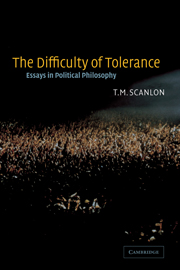Book contents
- Frontmatter
- Contents
- Acknowledgments
- Introduction
- 1 A theory of freedom of expression
- 2 Rights, goals, and fairness
- 3 Due process
- 4 Preference and urgency
- 5 Freedom of expression and categories of expression
- 6 Human rights as a neutral concern
- 7 Contractualism and utilitarianism
- 8 Content regulation reconsidered
- 9 Value, desire, and quality of life
- 10 The difficulty of tolerance
- 11 The diversity of objections to inequality
- 12 Punishment and the rule of law
- 13 Promises and contracts
- Index
9 - Value, desire, and quality of life
Published online by Cambridge University Press: 15 December 2009
- Frontmatter
- Contents
- Acknowledgments
- Introduction
- 1 A theory of freedom of expression
- 2 Rights, goals, and fairness
- 3 Due process
- 4 Preference and urgency
- 5 Freedom of expression and categories of expression
- 6 Human rights as a neutral concern
- 7 Contractualism and utilitarianism
- 8 Content regulation reconsidered
- 9 Value, desire, and quality of life
- 10 The difficulty of tolerance
- 11 The diversity of objections to inequality
- 12 Punishment and the rule of law
- 13 Promises and contracts
- Index
Summary
The notion of the quality of life suffers from an embarrassing richness of possibilities. First, there are a number of related but distinct questions with which this notion might be associated. What kinds of circumstances provide good conditions under which to live? What makes a life a good one for the person who lives it? What makes a life a valuable one (a good thing, as Sidgwick put it, “from the point of view of the universe”)? Second, each of these questions admits of different interpretations and a number of possible answers. Finally, there are a number of different standpoints from which the question of what makes a person's life better, in any one of these senses, might be asked. It might be asked from the point of view of that person herself, who is trying to decide how to live. It might be asked from the point of view of a benevolent third party, a friend or parent, who wants to make the person's life better. It might be asked, in a more general sense, from the point of view of a conscientious administrator, whose duty it is to act in the interest of some group of people. It might be asked, again in this more general sense, by a conscientious voter who is trying to decide which policy to vote for and defend in public debate and wants to support the policy which will improve the quality of life in her society.
- Type
- Chapter
- Information
- The Difficulty of ToleranceEssays in Political Philosophy, pp. 169 - 186Publisher: Cambridge University PressPrint publication year: 2003
- 15
- Cited by



